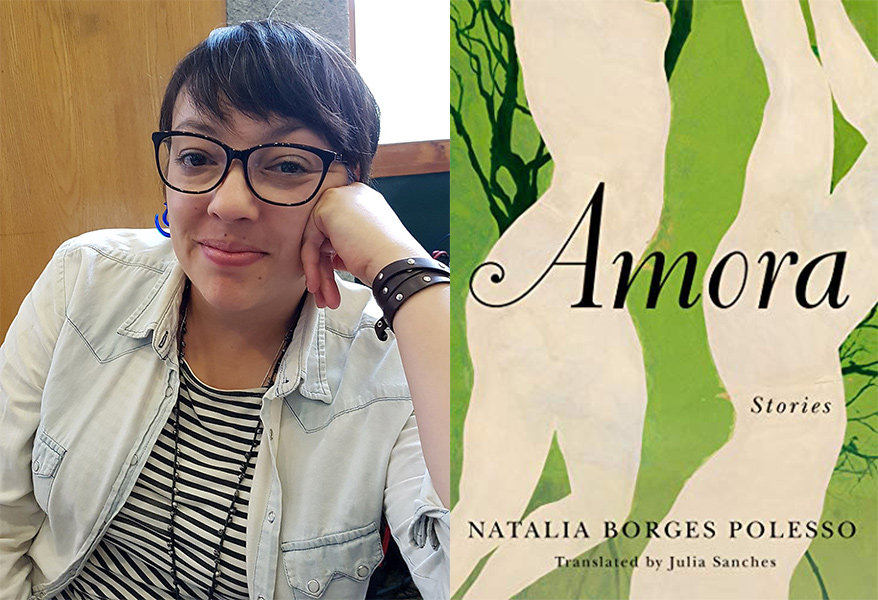Amora won several major literary prizes when it was first published in Brazil several years ago, and having just got my hands on the soon-to-be-published English translation, I can see why.
The short stories in this collection by Natalia Borges Polesso are often intimate, often poignant, and always beautifully written. They mostly explore love between women, all the way from teenage explorations to fifty-year relationships. They are a pleasure to read.

“Short stories” can encompass quite a range of formats, so let me make it clear that the stories in Amora are definitely on the shorter end of the spectrum: 33 stories in a book of about 250 pages. Some of the stories towards the end, in the “Short & Tart” section, are just a page or two, with beautiful writing but little plot to speak of: they reminded me more of prose poetry. Even the earlier ones in the “Big & Juicy” section are generally quite quick reads.
What this means is that, although some stories stood out for me over others, the collection made more of a holistic impression on me, as I read several stories in a single sitting, and the themes and characters from one story spilt over into another. The downside was that I didn’t get to stay very long with characters or situations that had intrigued me, but the advantage was an impressive sense of cohesion in a set of really quite disparate stories.
Much of the love in Amora is hidden. In the first story, a seventeen-year-old girl invents convincing details of losing her virginity to a boy in the back of a Chevette with 4 Non Blondes playing on the radio, as she tries to hide “the unmentionable thing”.
Even when she finally has a more satisfying encounter with the beautiful, red-lipped Leticia, they keep it secret:
“No one saw anything or said anything. Not even them.”
In another story, “My Cousin’s in Town”, a woman brings some work colleagues home, thinking her lover is away on business, but then she hears her in the shower as soon as she opens the door. She tells them Bruna is her cousin, in town for an exam, which causes problems because Bruna is more open about their relationship.
“After they left, I went to talk to Bruna and all she said was that at some point things would have to change. Then she laughed at the ridiculousness of it all and said the truth would’ve been painless, but … maybe, she wasn’t sure, maybe she was wrong. The fact is, we’re still trying.”
Although the stories are short, Polesso manages to cram in a lot of information and depth about each of the relationships she explores, so that by the end of each one, you really feel the nuances of them, the love, the loss, the deceptions and confidences.

In some stories, we see the surrounding homophobia that explains some of the secrecy. I loved “Flor”, in which a young child overhears her family referring to the neighbour, Flor, as a “machorra“. She asks what it means, and her mother lies and tells her it’s an illness, which prompts her to pick some flowers from around the house, put them in a glass and leave them for Flor, with a note wishing her to get well soon and asking her to “please put the flowers in a vase and return the glass because my mom would probably notice it was missing.”
Later her friend tries to explain what a machorra is by saying they’re women who like girls more than boys, and the little girl then thinks she must be a machorra too, because she likes girls more than boys, and so she thinks she’s sick too. It’s a touching story and a great way of exploring the disparaging language people use, through the innocent, as yet prejudice-free eyes of a child.
That’s not to say that all the stories in Amora are about secrecy and suppression, however, and the characters in them are certainly not victims. What comes across most strongly is the love and strength of feeling that no external disapproval can affect.
There’s a lot of humour in the stories, too. In “Aunt Betty”, Daniela and her partner Tereza visit hateful old Aunt Betty with Daniela’s gay cousin Marcos. They pretend that Marcos is married to Tereza and tell her Daniela has uterine cancer, and each time one of them leaves the room to go the bathroom, they eavesdrop on the nasty and completely misinformed things she says about them, laughing even more at what she would say if she knew the truth. It doesn’t sound that funny the way I’m describing it, but the scene really worked well.
The even shorter stories towards the end contained some beautiful imagery, but I found less to hold onto, and although I appreciated and admired the prose, I didn’t enjoy them as much as the earlier, more character-driven stories.
Overall, I’d recommend Amora to anyone looking for some thoughtful, beautifully written Brazilian fiction in translation. There are some truly memorable stories in this collection, and they work together beautifully to create a vision of all the diverse forms that love and human relationships can take. It’s a wonderful read.
As a side note, can any Portuguese speakers enlighten me on the meaning and/or nuances of “amora”? It’s the name of a character in one of the stories, but I also immediately thought of love. But then I discovered that love in Portuguese is actually “o amor”, a masculine word, and “amora” seems to mean “blackberry”. Can adding “a” make words feminine in Portuguese, so that “amora” could mean a feminine love, or does it not work that way?




There are 6 comments
Thanks for sharing this. I just pre-ordered the kindle edition due out may 5
Hi Mel, I’m glad to hear that! Hope you enjoy it, and I look forward to reading your review.
Even though “Flor” obviously has a very serious side, I feel like I can glimpse the humour in that situation too, which you’ve mentioned is prominent elsewhere in the collection too.
The wordplay on “sick” reminds me of a very different and lighter-in-tone misunderstanding in the middle-grade Beverly Cleary novel, Ramona the Pest, wherein Ramona goes to her first day of school and is directed to sit in a particular desk “for the present” and then is righteously indignant when she doesn’t receive a gift.
Yeah, there’s a lot of humour, alongside a lot of very serious and tough situations, which I think works really well in this book. I like that “for the present” example 🙂 Things like that must be a nightmare for translators, though, if the new language doesn’t have the same double meanings—which reminds me that I should have said Julia Sanches did a really good job with Amora.
Hi Andrew! What a great review! I’m brazilian and I’m a reader of Natália Polesso. Answering your question at the end of the text: grammatically speaking, adding the “a” at the end of the word “amor” (=love) doesn’t make it feminine. Althought this “tatic” can be used for many other words in portuguese (for exemple: Senhor – Mr. – Senhora – Mrs.), it doesn’t work that way in this specific case because we are talking about a feeling. Dispite beeing “treated” as a masculine word (“o” amor), it doesn’t really have a gender. It’s the same feeling for everybody, or for every situation. So, what the writter does is exactly what you have smartly detected: she “plays” with the word “amor”, sugesting that it could be that same feeling that we know, but apllied only to women (or suggesting that the book talks about love only between women), but, yet, using a word that already exists in the portuguese alphabet (“amora”, as you said before, is a fruit – a kind of berry). Hope I have helped! PS: sorry for the grammar mistakes. I’m not used to writte in English.
Hi Clarisse,
Thanks so much for this reply, and sorry that I missed it earlier. This is exactly the information I was looking for from a native speaker. Thank you! The title is a lovely use of language, and I’m glad to hear that my hunch was correct. No need to apologise for your grammar – you gave a clear explanation, and I understood everything perfectly!